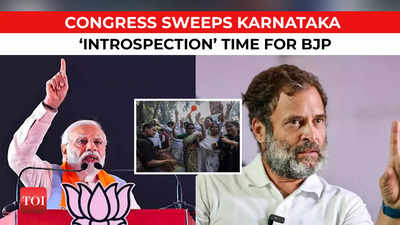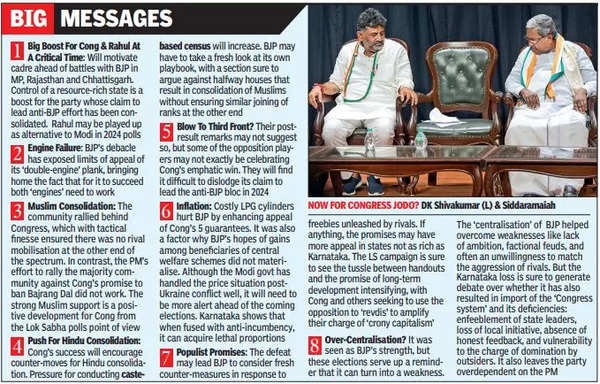- News
- Elections News
- Assembly Elections News
- Karnataka News
- Karnataka elections: Biggest win for any party in state since 1989; Congress 136, BJP 65
This story is from May 14, 2023
Karnataka elections: Biggest win for any party in state since 1989; Congress 136, BJP 65

BENGALURU: Building on a strong anti-incumbency mood created in part by voter concerns on prices and graft, Congress comfortably swept past the majority mark of 113 in the Karnataka assembly elections, winning 136 seats. Its victory left in its wake a chastened BJP - which had turned itself into a one-trick pony, relying almost entirely on PM Narendra Modi's popularity and charisma to win - with a modest score of 65.Congress's strong showing has left the third player in the state's politics, the Deve Gowda family's JD(S), staring at political irrelevance, and can potentially turn the state into a bipolar polity in 2024 when LS elections are scheduled.
In returning Congress to office at a time when it faces a crisis, Karnataka has lived up to its patternof coming to the party's rescue at critical junctures. It helped Indira Gandhi return to LS through a win in the Chikmagalur by-election in 1978. In 1999, when the party had lost two consecutive LS elections, Sonia Gandhi chose Bellary, besides Amethi, to make her electoral debut. In 1977, the state stood by the party when it was rejected in the north over Emergency excesses. In 1978, its win in the assembly polls launched a successful campaign for a comeback at the Centre.
The outcome on Saturday is no less important a lifeline. It will reassure Congress that it remains a viable option, burnish Rahul Gandhi's credentials as a challenger to Modi, and help it neutralise the efforts of regional satraps to muscle in on its space.
What Karnataka says, and does not say, about the 2024 polls

Remember Odisha in 2019: voting on the same day, people picked BJD in the state while BJP scored in Lok Sabha polls. Equally, BJP would make a mistake to write off Karnataka as a "one-off." Its loss, like the loss in Himachal Pradesh last year, shows BJP is vulnerable when poorer voters feel the economic pinch. It also shows that outside the Hindi belt and south of the Vindhyas, and especially where regional identity is strong, BJP is at risk with its one-nation-one-language-one-religion-one-leader pitch. Therefore, broadly, on the national stage, and since BJP's national leadership still carries more heft than the Opposition's, BJP will look to make Lok Sabha polls even more presidential. The opposition will want to localise Lok Sabha polls. But trying to localise a national election is a challenging task. What worked in Karnataka is that Congress projected only its local leaders, and the Gandhi family for once took a backseat. Rahul Gandhi wisely did not make his own political future a poll issue. But can the Gandhi family play only a supporting cast when it comes to general elections?
If Rahul Gandhi is projected as the opposition leader pitted against Modi in 2024, the clash in personalities may still be heavily weighted in favour of BJP. That said, the Karnataka win gives Congress a bridgehead to build on nationally. The big victory gives a demoralised party some self -confidence and shows a path towards rehabilitation at least in the states: namely keep elections as localised as possible and empower local leaders. In Siddaramaiah, Congress has a grassroots man-of- the-people leader, with a welfarist even socialist streak and a solid pro-poor connect. Congress's predicament is that such leaders are in short supply in a party dominated by drawing room politicians who can't win elections. For BJP, the question is while it remains dominant at the Centre, is it losing some grip in the states? One of the reality checks for BJP from the Karnataka loss is that welfarism may be denounced as freebies or 'revdi', but in times of distress, freebies are often seen as necessities by voters. In the last three years, Covid and lockdowns have hit incomes and jobs across India, particularly among weaker sections.
Beyond the bright lights of Bengaluru and in districts like Yadgir, studies have found alarming numbers of malnourished children. As we saw in Himachal Pradesh with Congress's campaign promise of the old pension scheme and as we have now seen in Karnataka where high prices of gas cylinders were a big issue, lower income voters want a cushion from economic difficulties. Woman voters -a key constituency almost everywhere - are perhaps the strongest votary of targeted welfarism. Of course, the Centre is not short on welfare schemes. There are any number of yojanas, there's Ayushman Bharat and a slew of central schemes that have created the "labharthi" class of beneficiaries, cutting across caste and religion and creating a support base for BJP. Congress campaigned in Karnataka on the premise of various guarantees- free rice and free power among them. So, 2024 could see a battle within a battle: BJP's labharthi versus Congress's guarantees, a contest of competitive welfarism. Karnataka 2023 gives another reality check in another key area: polarising ideological issues are subject to diminishing returns if economic concerns remain unaddressed. For the last 12 months in Karnataka the state BJP, harped on hijab, halal, azaan and Tipu Sultan. These issues barely resonated with voters beyond coastal Karnataka. Regional patterns on religious polarisation may vary, with northern states voting on identity issues more strongly than others. However, both Himachal Pradesh 2022 and Karnataka 2023 revealed a slowly growing trend. Religious mobilisation may face limitations when real voter concerns are economic. Hindu-Muslim politics is not a pan-India narrative. As for opposition unity, after Karnataka, Congress may be seen as a magnet for anti-BJP forces.
But Congress cannot be the sole driver. Instead of believing it is 'invincible', Congress will need to learn humility, particularly in places where it is not a player. In fact, no one is 'invincible' in today's politics. A popular prime minister can't make up for weak chief ministers. Nor does a party's victory in a state election mean that its national leadership is strong. Karnataka isn't India. But neither can state capitals be remote-controlled from Delhi.
In returning Congress to office at a time when it faces a crisis, Karnataka has lived up to its patternof coming to the party's rescue at critical junctures. It helped Indira Gandhi return to LS through a win in the Chikmagalur by-election in 1978. In 1999, when the party had lost two consecutive LS elections, Sonia Gandhi chose Bellary, besides Amethi, to make her electoral debut. In 1977, the state stood by the party when it was rejected in the north over Emergency excesses. In 1978, its win in the assembly polls launched a successful campaign for a comeback at the Centre.
The outcome on Saturday is no less important a lifeline. It will reassure Congress that it remains a viable option, burnish Rahul Gandhi's credentials as a challenger to Modi, and help it neutralise the efforts of regional satraps to muscle in on its space.
What Karnataka says, and does not say, about the 2024 polls
Congress's emphatic victory - a rarity these days - in Karnataka is mirrored by the acute state level anti-incumbency that felled BJP. But it's important to read the verdict carefully. Here are a few pointers. Congress shouldn't assume this victory as an early indicator for 2024, either in the state or nationally. Since 1985, Karnataka has voted differently when it comes to state and national elections, and many states now vote in a "split ticket".

Remember Odisha in 2019: voting on the same day, people picked BJD in the state while BJP scored in Lok Sabha polls. Equally, BJP would make a mistake to write off Karnataka as a "one-off." Its loss, like the loss in Himachal Pradesh last year, shows BJP is vulnerable when poorer voters feel the economic pinch. It also shows that outside the Hindi belt and south of the Vindhyas, and especially where regional identity is strong, BJP is at risk with its one-nation-one-language-one-religion-one-leader pitch. Therefore, broadly, on the national stage, and since BJP's national leadership still carries more heft than the Opposition's, BJP will look to make Lok Sabha polls even more presidential. The opposition will want to localise Lok Sabha polls. But trying to localise a national election is a challenging task. What worked in Karnataka is that Congress projected only its local leaders, and the Gandhi family for once took a backseat. Rahul Gandhi wisely did not make his own political future a poll issue. But can the Gandhi family play only a supporting cast when it comes to general elections?
If Rahul Gandhi is projected as the opposition leader pitted against Modi in 2024, the clash in personalities may still be heavily weighted in favour of BJP. That said, the Karnataka win gives Congress a bridgehead to build on nationally. The big victory gives a demoralised party some self -confidence and shows a path towards rehabilitation at least in the states: namely keep elections as localised as possible and empower local leaders. In Siddaramaiah, Congress has a grassroots man-of- the-people leader, with a welfarist even socialist streak and a solid pro-poor connect. Congress's predicament is that such leaders are in short supply in a party dominated by drawing room politicians who can't win elections. For BJP, the question is while it remains dominant at the Centre, is it losing some grip in the states? One of the reality checks for BJP from the Karnataka loss is that welfarism may be denounced as freebies or 'revdi', but in times of distress, freebies are often seen as necessities by voters. In the last three years, Covid and lockdowns have hit incomes and jobs across India, particularly among weaker sections.
Beyond the bright lights of Bengaluru and in districts like Yadgir, studies have found alarming numbers of malnourished children. As we saw in Himachal Pradesh with Congress's campaign promise of the old pension scheme and as we have now seen in Karnataka where high prices of gas cylinders were a big issue, lower income voters want a cushion from economic difficulties. Woman voters -a key constituency almost everywhere - are perhaps the strongest votary of targeted welfarism. Of course, the Centre is not short on welfare schemes. There are any number of yojanas, there's Ayushman Bharat and a slew of central schemes that have created the "labharthi" class of beneficiaries, cutting across caste and religion and creating a support base for BJP. Congress campaigned in Karnataka on the premise of various guarantees- free rice and free power among them. So, 2024 could see a battle within a battle: BJP's labharthi versus Congress's guarantees, a contest of competitive welfarism. Karnataka 2023 gives another reality check in another key area: polarising ideological issues are subject to diminishing returns if economic concerns remain unaddressed. For the last 12 months in Karnataka the state BJP, harped on hijab, halal, azaan and Tipu Sultan. These issues barely resonated with voters beyond coastal Karnataka. Regional patterns on religious polarisation may vary, with northern states voting on identity issues more strongly than others. However, both Himachal Pradesh 2022 and Karnataka 2023 revealed a slowly growing trend. Religious mobilisation may face limitations when real voter concerns are economic. Hindu-Muslim politics is not a pan-India narrative. As for opposition unity, after Karnataka, Congress may be seen as a magnet for anti-BJP forces.
But Congress cannot be the sole driver. Instead of believing it is 'invincible', Congress will need to learn humility, particularly in places where it is not a player. In fact, no one is 'invincible' in today's politics. A popular prime minister can't make up for weak chief ministers. Nor does a party's victory in a state election mean that its national leadership is strong. Karnataka isn't India. But neither can state capitals be remote-controlled from Delhi.
End of Article
FOLLOW US ON SOCIAL MEDIA
